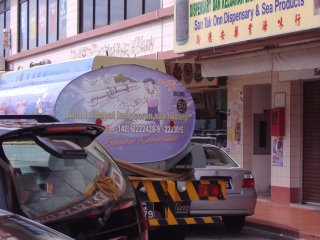The Future of Water and Electricity in Brunei
 I was in the Kiulap area last Sunday when this water truck passed by. It was very colourful and not the normal khaki/gray colour of the Public Works Department. The tank had cartoon images and slogans about saving water. Unfortunately, the truck zoomed very fast (which it shouldn't) so, I only managed to get a shot of the back of the truck. The message on the truck is for us to save water.
I was in the Kiulap area last Sunday when this water truck passed by. It was very colourful and not the normal khaki/gray colour of the Public Works Department. The tank had cartoon images and slogans about saving water. Unfortunately, the truck zoomed very fast (which it shouldn't) so, I only managed to get a shot of the back of the truck. The message on the truck is for us to save water.I am not sure which building is short of water in that area. But the way we Bruneians used our water - the possibility of running out of water is a real possibility. I remembered sometime last year, the Minister of Development stated in a speech that each of us Bruneians consumed almost 400 litres of water per day or the equivalent of about 300 bottles of SEHAT water every single day. What is that in comparison to our neighbouring countries? In Singapore, each Singaporean only consumes 160 litres a day, in Hong Kong 203 litres a day and in Tokyo, the Japanese only consumed 260 litres a day. So 400 litres is a lot of water to be consumed by us Bruneians. You may want to ask yourself why that is so. Is it any hotter here compared to Singapore? Or are we any cleaner, say, compared to the Japanese?
And it's not just water. At the same time, the Minister also indicated that even for electricity, we are pretty wasteful - Singapore used 7,778 kilowatt/hour per capita per year compared with 7,316 kw/h for us here Brunei, 5,612 kw/h for Hong Kong and 2,882 kw/h for Malaysia. It means 20 kw/h per day per capita is used in Brunei. This level of consumption was equal to the consumption levels in Japan and Taiwan and the rest of the Asean countries, where in the context of energy used in those countries - they are utilised more for the productive use in industries. However in the context of Brunei the main users are not our productive industries but us residential users.
Some have blamed that this situation is not entirely the fault of the Bruneian consumers and are actually influenced by the current water and electricity tariff structure which has been in place since the 1960s thus making the prices charged in Brunei the lowest in the region. This in turn has encouraged people to consume water and electricity excessively. The tariff structure is designed in such a way that big users are rewarded and low usages are not encouraged.
Even if this true, we should never forget that the prosperity that we have may not last. If this persist, one day we may find ourselves to be a net importer of oil and gas instead of importing it. If our population and economy continues to increase and develop at the current rate, the demand for energy will increase by about 3 to 5 per cent every year. We will have greater difficulty sustaining our oil and gas exports to earn income for the country but we will instead be squandering it to generate energy for our airconds, our decoration lights and other wasteful use.


Comments